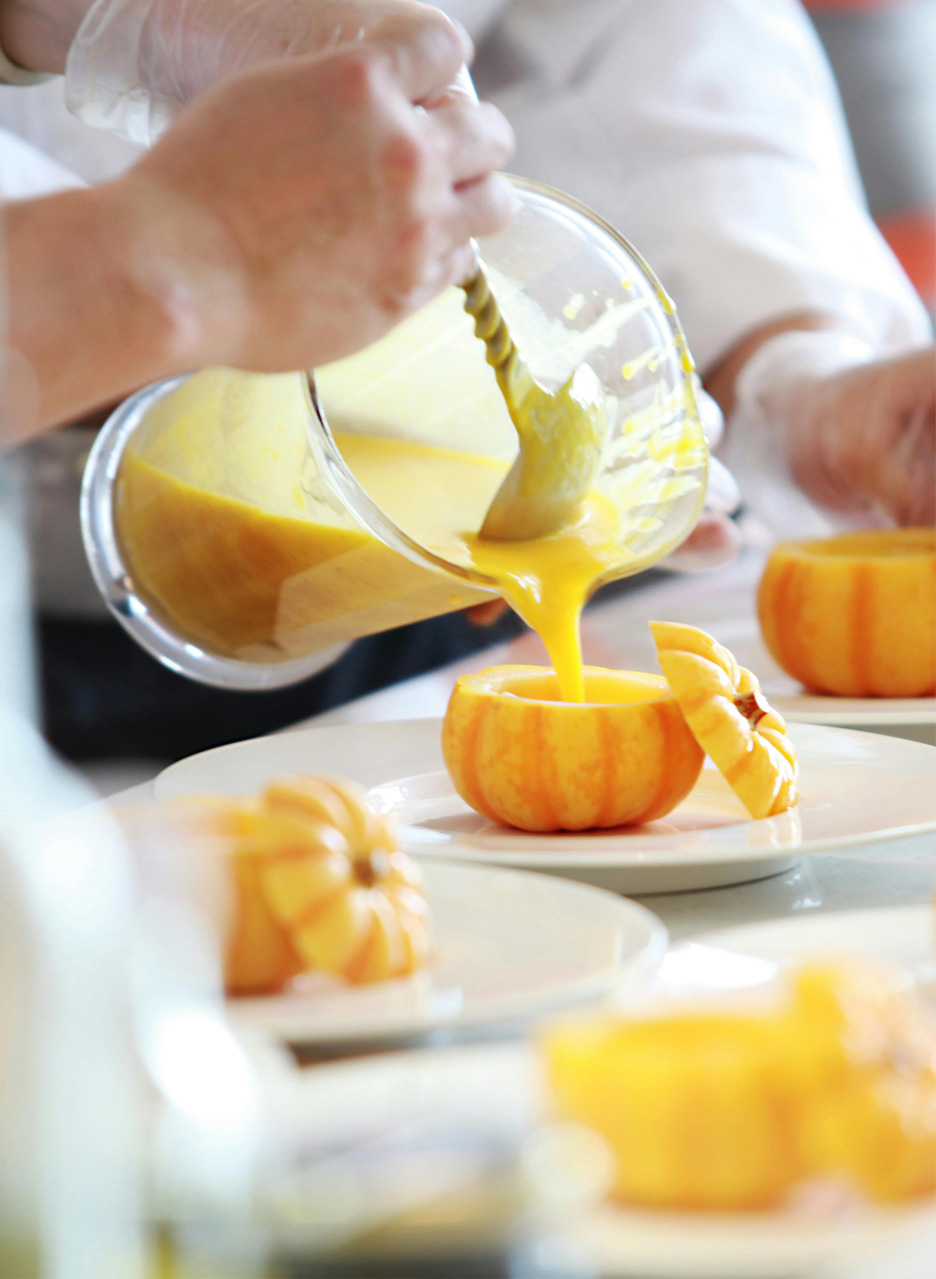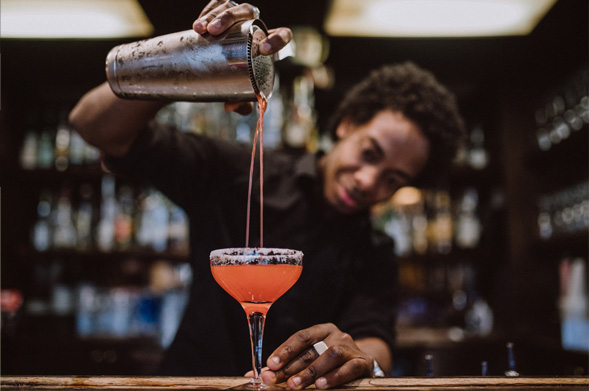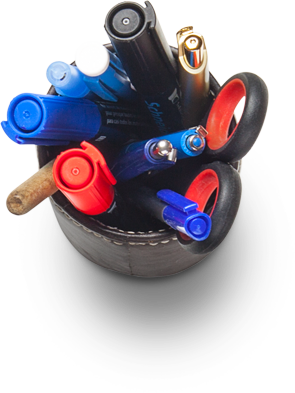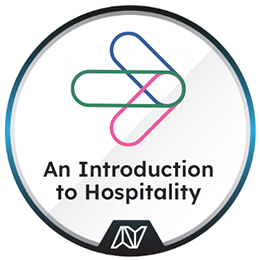
minutes average completion time
An Introduction to the Hospitality Industry
In this course we will explore the industry of hospitality, the range of sectors and the required skills and knowledge, to be a successful team member in front & back of house job roles. We will also look at just a few exciting opportunities and career pathways that exist.
What is Hospitality
The literal meaning of the word hospitality is “the friendly and generous reception and entertainment of guests, visitors and strangers”. However, from an industry point of view it means the business of providing food, drink and accommodation.
Whenever there are groups of people there is likely to be some sort of hospitality service.
The hospitality industry is regarded as extremely important to the economy of the United Kingdom and is considered to be the 3rd largest business sector.
Hospitality employs over 3 million people, contributing over 50 billion pounds to the government, and last year attracted 7 billion pounds of business investment.
In hospitality there is a job for anyone at any level and is one of only a few business sectors that provides employment opportunities in remote/seasonal areas where other industries may struggle.
Ask Yourself
1. We have learned that the hospitality industry means the business of providing food, drink, & accommodation. Think of a town or city near you, how many hospitality establishments can you name?
2. What services do they provide? Food, drink, accommodation?

3. As you scan through your local town/city it is surprising just how many businesses are included under the umbrella of Hospitality, Pubs, Bars, Hotels, Cafés etc, but did you consider: Care Homes, Hospitals, Schools, Military Bases, Tourist Attractions, Prisons, Cruise Industries, Large Business Catering, Sport and Entertainment?

Did you know?
Hospitality supports an estimated 53,300 jobs across 3100 businesses, across Hampshire and the Isle of Wight.
Hospitality Pathways & Scope
The Hospitality Industry is growing all the time and provides excellent opportunities for training and employment.
Broadly speaking, the industry is broken down into two main categories:
Commercial Sector
Commerical businesses that need to make a profit
to survive include:
- Hotels
- Pubs
- Bars
- Cruise Ships
- Casino’s
- Fast Food Chains
- Catering for Business
Public Sector
Where the priority is to supply a public service
and not to make a profit:
- Hospitals
- Schools
- Prisons
- Armed Forces
- Nursing Homes

Commercial hospitality businesses focus on profit, while public sector equivalents aim to provide affordable, accessible services for the community.

Employment Structure
The jobs below give you an idea where you could start or enter the Hospitality Industry.
1. Entry Level
These job roles are often practical and hands on giving the opportunity to develop your craft. At this level you will be paid for what you do, speed, organisation and following instruction are paramount.
Job roles could include:
- Commis Chef – (Junior Chef)
- Receptionists
- Waiting staff
- Accommodation staff
- Kitchen assistant
- Hotel porter
2. Team Leadership
This is considered the early stages of management, often still an operational hands-on role with the addition of supervising small teams/departments. As a team leader you can practice the craft of management, communication and setting targets.
Job roles could include:
- Assistant manager
- Chef de partie – (Section Chef)
- Chef de rang – (Front of House Section Supervisor)
- Breakfast supervisor
- Shift leader
- Bar supervisor

3. Management
Managers are responsible for ensuring the day-to-day hospitality business runs smoothly whilst maintaining financial targets, Managers are responsible for legal requirements like health/food safety, they also plan and forecast for the future.
Job roles could include:
- Chef Manager
- Executive Head Chef
- Restaurant Manager
- Catering Manager
- Head of House Keeping
- General Manager
- Duty Manager
Personal Attributes Hospitality Employers Value
- Team player
- Ability to work under instruction.
- Hardworking
- Customer Focussed
- Loyal
- Reliable
- Self-Motivated

As a team leader you can practice the craft of management, communication and setting targets.
Example careers in Hospitality
Click on the buttons below to learn about some of the different jobs in Hospitality available…
Commis Chef
As a Commis chef you will play a vital role in assisting senior chefs with daily kitchen tasks and preparation of ingredients, ensuring seamless kitchen operations while adhering to health, safety, and hygiene standards at all times. This is an excellent opportunity for someone looking to enhance their skills and work in a fast-paced, high-energy environment.
Key skills & qualifications:
• Food hygiene certificate (Essential)
• Team player (Essential)
• Good communicator (Essential)
• Ability to work under instruction (Essential)
• Passionate about self-development (Essential)
• Level 2 Professional Chef qualification (Desirable)
• Prior experience in a similar role (Desirable)
Average salary – £2000 Per Month
Front of House Service
Have you considered Front of House Service?
Imagine a busy restaurant, filled with laughter and the aroma of delicious food. You, as a key member of the front-of-house team, play a vital role in creating unforgettable dining experiences.
What is Front of House Service?
“All customer facing roles in a hospitality setting”
These roles include:
- Waiters/Waitresses
- Housekeeping
- Welcome Host
- Bartenders
- Baristas
- Reception and Concierge
Industry professionals develop diverse skills, learn different service styles, customer relations, wine knowledge, cocktail mixing and speciality hot drinks.
Importance of Front of House team members
The role of a front of house team member is crucial to hospitality establishments, guest satisfaction, brand image, and overall business success. You are the first impression of the business to the customer (No Pressure!)
Industry professionals are passionate about customer service and can make or break a leisure experience, celebration or business conference.
Good service is a craft that attracts motivated, positive individuals who work under pressure with a calm and assertive manner.

Why Choose Front of House Service?
- Fast-Paced & Dynamic with Excellent Earning Potential
Every day is different with exciting opportunities to learn and grow. Don’t forget you can gain tips, bonuses, and opportunities for promotion which can lead to significant earnings. - Travel & International Opportunities
Explore the world! The hospitality industry offers global career opportunities, allowing you to travel and experience different cultures.

The role of a front of house team member is crucial to hospitality establishments, guest satisfaction, brand image, and overall business success…
Job Oportunities
Entry-Level Positions include:
Supervisory-Level Positions include:
Management-Level Positions include:
Waiter/Waitress
Taking orders, serving food and beverages, ensuring guest satisfaction.
Host/Hostess
Greeting guests, managing reservations, seating customers.
Restaurant supervisor
Leading a team of servers, ensuring smooth service, handling guest requests.
Head Waiter/Waitress
Supervising service, assisting with wine pairings, resolving guest concerns.
Housekeeping Supervisor
Restaurant Manager
Leading a team of servers, ensuring smooth service, handling guest requests.
Food & Beverage Manager
Managing all food and beverage service within a hotel or other establishment.
Head of Department
High-level management position responsible for the overall success of a hospitality business
Professional Cookery
What does a Career as a chef look like?
The Culinary world offers a diverse range of career opportunities, Passion, hard work, and continuous learning are key to success.
Embrace challenges and strive for excellence.
Never stop exploring and experimenting!
Chefs are a practical workforce, and they learn by doing. Senior chefs are paid for what they know and ability to pass on their craft; leadership and team management being a key soft skill of the role.
The fundamental skill of being a chef can be transferred to many differing establishments for example Travel & Tourism/Customer Service & team orientated industries.
A Day in the Life of a Professional Chef
A typical day for a professional chef is a whirlwind of activity, creativity, and precision.

It may include:
- Receipt and control of supplies
- Preparation: Butchery, Fishmonger, Vegetable/Salad, Hot & Cold desserts etc.
- Setting up and controlling service periods, Breakfast, Lunch, Afternoon Tea, Dinner.
- Food Safety tracking & monitoring
- Menu planning and dish development

Head Chef
Rotas, menu planning, supplies ordering, costs and budget control, training, policy supervision, kitchen supervision.
Sous-Chef
Supervise the kitchen team and deputise for the Head Chef.
Pastry Chef
Chef de Partie (Mains)
In charge of a section (veg, fish etc).
Chef de Partie (Starters)
In charge of a section (starters).
Commis Chef
Manual work, mostly of a lower skill requirement.
Professional Cookery
Have you got what it takes?
As a professional chef you will require the following skills:
- Working well within a team
- Being able to follow instructions
- Organising your section
- Having pride in your work
- Bring involved in creative ideas
- Being consistent in your work
- Respecting food safety law
- Being flexible & embracing change
Chefs are a practical workforce, and they learn by doing. Senior chefs are paid for what they know and ability to pass on their craft; leadership and team management being a key soft skill of the role.

Typical Kitchen Hierarchy
Click on the buttons below to find out more about each role in the kitchen.
Head Chef
Rotas, menu planning, supplies ordering, costs and budget control, training, policy supervision, kitchen supervision.
Sous-Chef
Supervise the kitchen team and deputise for the Head Chef.
Pastry Chef
Chef de Partie (Mains)
In charge of a section (veg, fish etc).
Chef de Partie (Starters)
In charge of a section (starters).
Commis Chef
Manual work, mostly of a lower skill requirement.
Have you thought about Culinary Career Pathways?
Hotels, Pubs & Restaurants:
Multi outlet establishments with differing service styles: Casual Dining, Buffets, Afternoon Tea, A la carte, Room service. Staff members often gain a multi skilled approach as teams are generally smaller, a great start to any hospitality career.
Events:
Weddings, Sporting Events, typically a mobile job where every event is different, often high volume and bespoke.
Cruise Ships:
A career as a chef on a cruise ship offers a unique opportunity to combine your passion for cooking with the thrill of exploring the world.
Social Care:
Being a chef in social care is a rewarding opportunity to combine your culinary skills with a passion for helping others. In this role, you’ll prepare delicious and nutritious meals for vulnerable individuals.
Contract Catering:
Typically large businesses/public service sector, high volume catering with a focus on food safety & nutritional value.

Staff members often gain a
multi skilled approach as teams
are generally smaller, a great
start to any hospitality career.
What about Specialist Career Routes?
When a Chef is equipped with solid fundamental skill and knowledge, they may wish to specialise in certain areas,
for example:
Pastry Chef: This could include being a baker or working solely in a dessert section of a catering establishment.
Chocolatier: Creating masterpieces out of chocolate, competition work, artisan craftsmanship.
Development Chef: Creating menu concepts, training, costing and analysis.
Teacher: Teaching the next generation of Chefs, hosting courses for anyone passionate about Cookery.
Private Chef: Tenerally working and living with a family of UHNW (ultra-high net worth families).

8 Steps to get you Started
- Make a list of your personal strengths and interests
- Follow hospitality companies on social media
- Check out the careers section in the library
- Speak with a career’s advisor
- Explore apprenticeship options in hospitality
- Look at the skills required for careers that interest you
- Create a portfolio of your favourite achievements
- Set and follow-up on career-related goals



Career Path Questionnaire
This simple questionnaire might help you to identify some career pathways that suit your personal interests and your skills. This questionnaire comes in 2 parts. The first part of this activity is a simple questionnaire.
Using the options in the table below, answer each of the questions by selecting a number in one of the columns, based on the following:
1 = Dislike a lot 2 = Dislike 3 = Don’t Mind 4 = Like 5 = Like a lot
Based on your personal interest and skills, you may be interested in the jobs shown in the highlighted section below.
Guest Facing Roles
Customer Service
Roles explored in this course:
- Receptionist
- Waiting Staff
- Front of House
- Welcome Host
- Bartender
- Barista
- Reception Concierge
- Hostess
- Hotel Porter
- Chef de Rang
- Breakfast Supervisor
- Bar Supervisor
- Shift Leader
You scored
in this category.
Food Production
Back of House
Roles explored in this course:
- Commis Chef
- Commis Chef
- Kitchen Assistant
- Chef de Partie
- Chef Manager
- Executive Head Chef
- Catering Manager
You scored
in this category.
Housekeeping
Management
Roles explored in this course:
- Accommodation Staff
- Housekeeping
- Head of Housekeeping
- Restaurant Manager
- Food and Beverage Manager
- Assistant Manager
- Duty Manager
- General Manager
- Catering Manager Civil
You scored
in this category.
Check Your Knowledge
So now you’re well on the way to understanding about Hospitality, answer the multi-choice questions below to see how much you really know.
Good luck!
Well done. You have successfully achieved the pass mark for this course. All the correct answers are now shown.
You haven’t achieved the pass mark on this occasion. Have another go.
You haven’t quite reached the pass mark for this course, but all of the correct answers are now shown. Please study these before moving on, or feel free to go back and look again at any of the pages of this course.
Congratulations
You have successfully completed this course.
Exit Course
